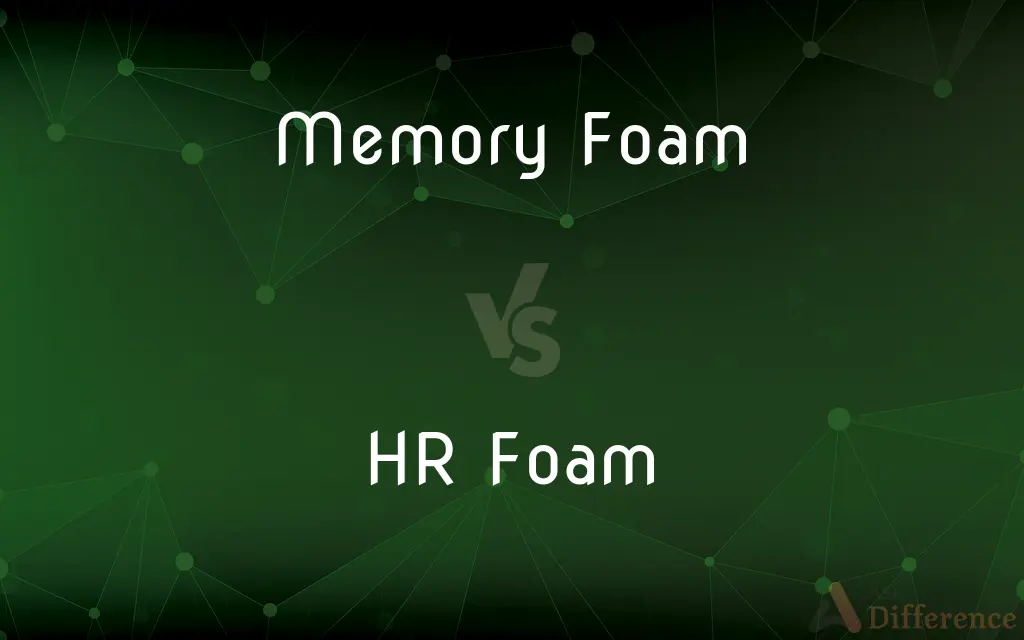Memory Foam vs. HR Foam — What's the Difference?
By Tayyaba Rehman — Published on January 19, 2024
Memory Foam is a viscoelastic material that molds to the body in response to heat and pressure. HR Foam, or High Resilience Foam, is more responsive and bounces back to its original shape quickly.

Difference Between Memory Foam and HR Foam
Table of Contents
ADVERTISEMENT
Key Differences
Memory Foam, developed by NASA, contours to the body, providing excellent support and pressure relief. HR Foam, known for its high resilience, offers a firmer support and quickly returns to its original shape after pressure is removed.
Memory Foam's temperature sensitivity allows it to adjust to the sleeper's body heat and weight. HR Foam, however, is less affected by temperature and provides consistent support regardless of heat or cold.
Memory Foam is often used in mattresses and pillows for its ability to reduce pressure points. HR Foam is preferred in sofas and furniture for its durability and ability to maintain shape over time.
The slow recovery time of Memory Foam creates a 'sinking' feeling, which some find comfortable for sleeping. HR Foam responds more rapidly, offering a more supportive and less enveloping feel.
Memory Foam is suitable for those who prefer a softer, contouring sleep surface. In contrast, HR Foam is ideal for those who require firmer support, such as in seat cushions and firmer mattresses.
ADVERTISEMENT
Comparison Chart
Material Characteristics
Viscoelastic, molds to body
High resilience, quickly regains shape
Response to Temperature
Sensitive to temperature
Less temperature sensitive
Common Usage
Mattresses, pillows
Sofas, furniture cushions
Recovery Time
Slow, 'sinking' feel
Quick, supportive feel
Ideal For
Pressure relief, contouring sleep surface
Durability, firm support
Compare with Definitions
Memory Foam
Ideal for pressure relief and reducing motion transfer.
Their memory foam bed reduced back pain and improved sleep quality.
HR Foam
Less sensitive to temperature changes, maintaining its firmness.
Even in cold weather, the HR foam mattress stayed firm.
Memory Foam
Viscoelastic material that contours to body shape.
The memory foam mattress provided excellent body support.
HR Foam
Used in applications where quick shape recovery is needed.
The HR foam in the gym mats quickly sprang back after each use.
Memory Foam
Responds to body heat and pressure for comfort.
The memory foam pillow adapted perfectly to her head shape.
HR Foam
High Resilience Foam that quickly returns to its original shape.
The HR foam sofa retained its shape even after heavy use.
Memory Foam
Commonly used in mattresses, pillows, and mattress toppers.
He added a memory foam topper for extra comfort.
HR Foam
Ideal for furniture that requires firm and supportive cushioning.
The office chairs used HR foam for long-lasting support.
Memory Foam
Absorbs and distributes body weight evenly.
The memory foam cushioned his joints and muscles.
HR Foam
Provides consistent firm support and durability.
The HR foam seats in the car remained firm and comfortable over years.
Common Curiosities
What is Memory Foam made of?
Memory Foam is made from viscoelastic polyurethane foam.
What does HR in HR Foam stand for?
HR stands for High Resilience.
Does Memory Foam retain heat?
Yes, traditional Memory Foam can retain body heat, but newer versions have cooling technologies.
Is Memory Foam good for back pain?
Yes, Memory Foam can help alleviate back pain by providing support and relieving pressure points.
Does HR Foam provide good pressure relief?
HR Foam provides less pressure relief compared to Memory Foam, focusing more on support.
Can Memory Foam mattresses be flipped?
Most Memory Foam mattresses are not designed to be flipped.
Can HR Foam be used in mattresses?
Yes, HR Foam is used in mattresses, especially for those preferring firmer support.
How long does HR Foam last?
HR Foam is durable and can last for several years, maintaining its shape and firmness.
Is Memory Foam hypoallergenic?
Memory Foam is generally hypoallergenic, resisting dust mites and allergens.
Does Memory Foam lose its memory?
Over time and with regular use, Memory Foam may lose some of its elasticity and contouring abilities.
Is HR Foam more expensive than Memory Foam?
The price varies based on quality, but generally, HR Foam can be more expensive due to its durability.
Does Memory Foam smell?
New Memory Foam can have an off-gassing smell, which usually dissipates over time.
Is Memory Foam good for side sleepers?
Yes, Memory Foam is often recommended for side sleepers due to its pressure-relieving qualities.
How is HR Foam different from regular foam?
HR Foam has higher resilience, meaning it returns to its original shape faster and lasts longer than regular foam.
Can HR Foam be recycled?
Yes, like many foam products, HR Foam can be recycled, depending on local recycling facilities.
Share Your Discovery

Previous Comparison
Polo vs. Ralph Lauren
Next Comparison
MAC 10 vs. UziAuthor Spotlight
Written by
Tayyaba RehmanTayyaba Rehman is a distinguished writer, currently serving as a primary contributor to askdifference.com. As a researcher in semantics and etymology, Tayyaba's passion for the complexity of languages and their distinctions has found a perfect home on the platform. Tayyaba delves into the intricacies of language, distinguishing between commonly confused words and phrases, thereby providing clarity for readers worldwide.













































